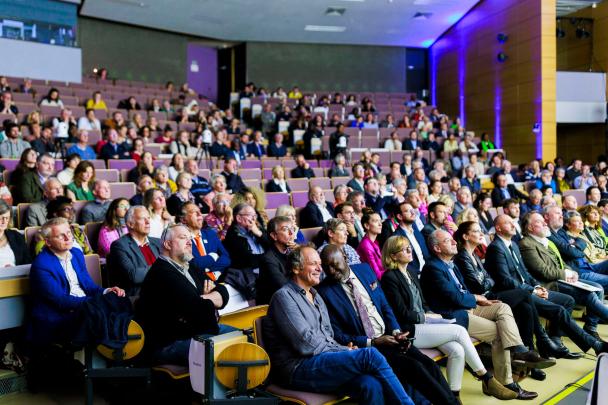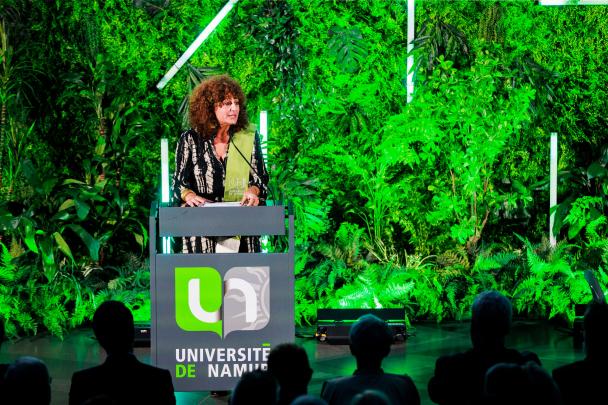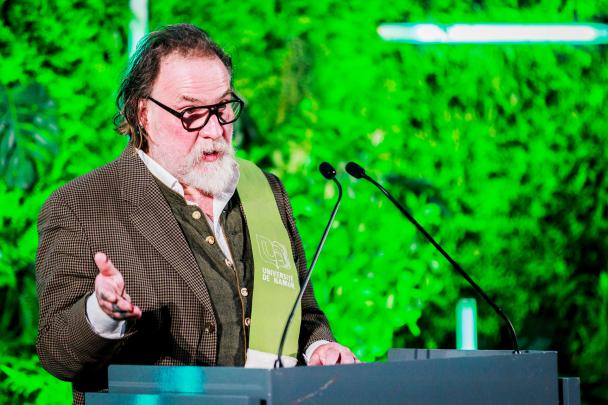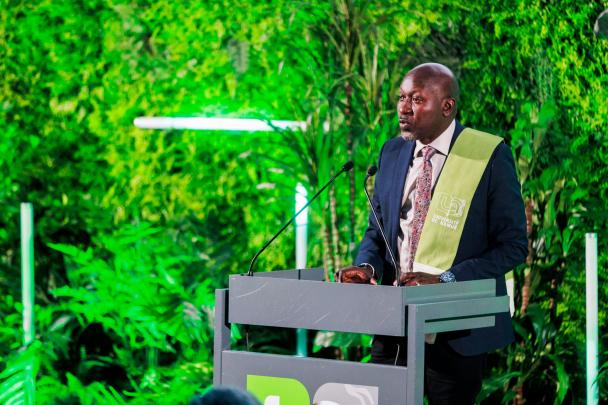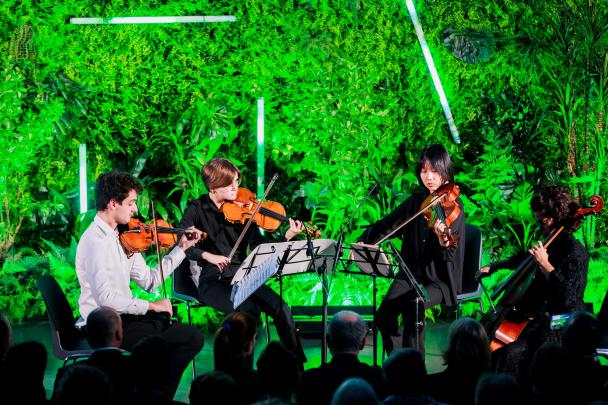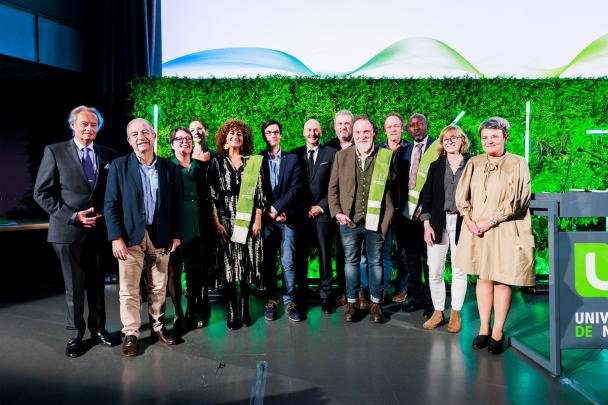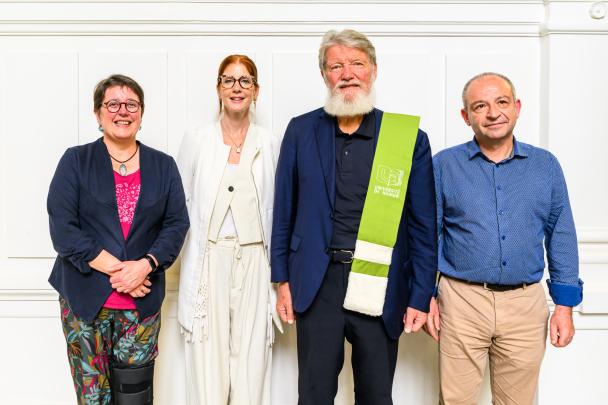"Honor to the Heralds" was the theme chosen for the start of the academic year and the awarding of the insignia of Doctors Honoris Causa to four committed personalities who through their art, their profession, or their vocation, in the manner of those heroic messengers of the Middle Ages, carry high the voice of those denied a voice.
Read below the speech delivered by UNamur's Rector, Annick Castiaux, at the closing of the official academic start ceremony on September 30, 2024.
Ladies and gentlemen in your titles and capacities,
Dear students, dear colleagues,
Friends of the University of Namur,
I would first like to thank you for your large and warm presence. It falls to me to close this beautiful ceremony. And so I am all that stands between you and the moment of conviviality that awaits us. But I'd like to hold you for a few more minutes to share with you what our new honorary doctors inspire me for the university.
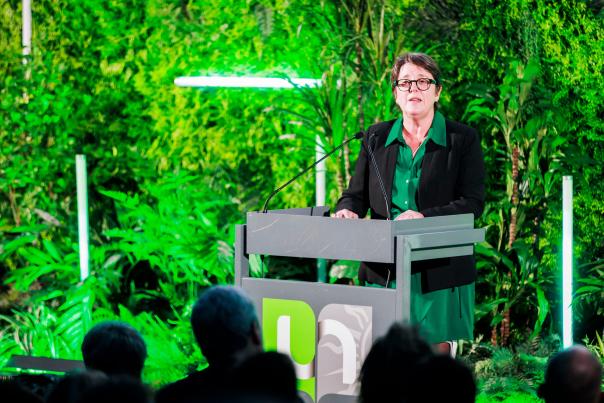
Our new Doctors Honoris Causa (in our parlance, DHC) are whistleblowers, heralds, as we've called them, who, convinced of the importance of the message they hold, don't hesitate to put their safety, comfort and reputation at risk to make it heard. The battle of the whistleblowers, though recently popularized, is not new. This reminded me of some ancient myths and allegories. I hope my colleagues in the Faculty of Philosophy and Letters will forgive me for any approximations. Do you remember Phidippides, the hemerodist who, according to Herodotus, travelled more than 250 km in 36 hours to solicit Sparta's help from the Athenians who were in trouble with the Persians during the 1st Median War? The Spartans didn't respond to his appeal, too busy with their domestic duties, but this didn't prevent the Athenians from emerging victorious from the battle. And what about Cassandra, daughter of Priam, King of Troy, who could predict the future? She tried to warn her compatriots of the danger represented by the famous horse offered by the Greeks, but the Trojans didn't believe her. The outcome is less glorious for the Trojans than for the Athenians, since the horse will be their undoing. Or Plato's Allegory of the Cave? Plato imagines that one of the cave's inhabitants escapes and discovers the world of light (i.e., knowledge). Then, courageously, this escapee returns to the cave to warn his former companions of the beauty of the outside world. Plato wonders how the cave dwellers will react to this news. He imagines that the messenger would be poorly received, perhaps even killed by his former companions, unable to understand him, too frightened by a truth beyond them.
These ancient myths highlight the multiple difficulties faced by messengers: difficulty of discovery, like the cave-dweller who discovers the outside world in suffering, his eyes dazzled by the light, his brain struggling to understand this new reality; difficulty of carrying the message, like the hemerodist who suffers physically to solicit Sparta's help; difficulty of being heard, like Cassandra who is never believed; difficulty of not being heard, because of indifference, ignorance or fear.
As a university, our role is to fight against the causes of this deafness which is still too often ours in the face of bad news, in the face of uncomfortable situations. Scientific research, thanks to its rigorous methods and critical sense, is a force for bringing to light indisputable facts that it is necessary to dare to look at in their brutality, sometimes. The brutality of the facts of climate change, the brutality of the facts of migration, the brutality of the facts of poverty... We have the tools to fight ignorance. We just need to overcome fear and indifference. In 1976, the University of Namur founded FUCID (Forum Universitaire pour la Coopération Internationale au Développement). Since then, FUCID's mission has evolved from international cooperation to lifelong education, helping us to train responsible, committed individuals. For several years now, we have been introducing active teaching methods, enabling students to apply the knowledge and skills we impart to the sometimes difficult realities of the world around us. We also support multi-disciplinary activities that contribute to understanding others. I'm thinking of this year's launch of the Journées d'Education au Développement Durable et à la Transition Ecologique (Sustainable Development and Ecological Transition Education Days), 3 days for all 3rd-year undergraduates, in dialogue with each other and with outside players. Or the hackathon organized for several years by students from the Faculty of Computer Science, with the support of their teachers. This year's theme: disability. And in 2025: culture, which will be invaluable in the context of Namur, European Capital of Culture. Or the 3rd red thread that runs through all the Faculty of Law's programs, this time on the theme of inclusion. Future projects are also numerous, such as the interdisciplinary Master of Science in Sustainable Development in the Faculty of Science, which we have proposed as a new habilitation. So many initiatives that enable all of us, teachers and students alike, to overcome our fears and indifference, to build new knowledge, to be at the service of society's great challenges.
Are we doing enough, though? For some time now, academics have been encouraged to step out of their sometimes retreating position as researchers accustomed to seeing their investigations through to the end before making any statements whatsoever. This was particularly the case during the health crisis, when many of our colleagues came out of their reserve to inform, convince and help overcome the crisis.
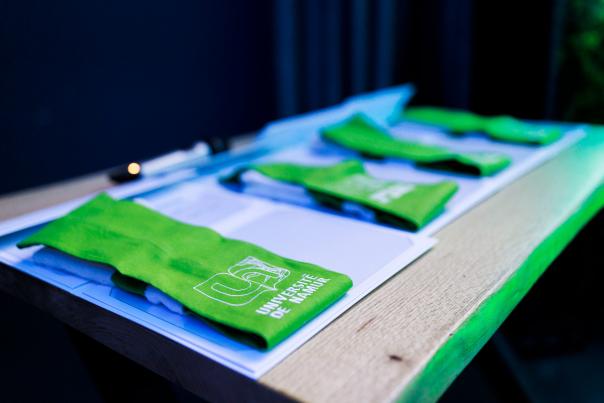
Most of them have managed to maintain a position rooted in their scientific expertise, but it's not easy when you're faced with a journalist who absolutely wants an answer. I remember an interview at the very beginning of my mandate when I was asked my opinion on the veil and political Islam... I remember coming out of it with a pirouette, but with an enormous sense of discomfort and the feeling of having been tricked into giving an opinion on a subject I didn't master. Last year, the academic world was rocked by student protests over the conflict in the Middle East. Universities are places for the free expression of opinions and indignation. Faced with the atrocities suffered by populations caught up in the conflict, we cannot be indifferent. But the way in which these demonstrations have been held in certain Belgian, French and American universities poses a problem. There was no question of dialogue, contradictory debate or exchanges that would encourage the emergence of knowledge. The demonstrators have adopted a dogmatic stance with no intention of listening to the reality of our universities or leaving room for debate. They even questioned the freedom to research, to collaborate with the best in the field, to contribute to the development of knowledge precisely where it is most needed. They have violently accused university authorities of complicity with the Israeli state, of genocide...
At UNamur, we were subjected to little of this violence, while showing solidarity with other universities going through complicated times. The CREF, the French-speaking Rectors' Council, affirmed its unity and solidarity in this context, as in many others, more and more numerous. There have been a number of legitimate demonstrations on campus, organized with our support and respect for all parties. Some will say it's because UNamur students are nice... It's true, our students are nice and respectful, but it's not just that. Thanks to our modest size, we are fortunate to be able to count on close relations with all our student associations, which we decided two years ago to recognize in all their diversity, enabling us to establish a structural dialogue with them. This fosters exchange and construction at the interface between different trends and perceptions. This is also the role of the university: to be a place of freedom of opinion encouraging conversation, for the benefit of the construction of truth.
Denouncing injustice is important, but how do we turn the message into action? Our 4 Doctors Honoris Causa, Father Pedro Opeka, Zeina Abirached, Bouli Lanners and Bob Rugurika, don't just issue alerts, messages and share a vision of the world. They are also involved in building tomorrow's world. They are helping to move towards greater social and environmental justice.

What about universities? What about our university? Back in 1973, Pedro Arrupe challenged Jesuit educational institutions about their ability to educate for justice. Particularly sensitive to the plight of the marginalized in our world, including refugees (whom we try to welcome as best we can as a hospitable university), he noted a deficiency in this area and asked to "ensure that, in the future, the education provided in Jesuit institutions is equal to the demands for justice in the world (1) ". As Rector of the University of Namur, I feel, 51 years later, still concerned by the need to make progress in this direction. In the current context, taking social justice issues into account has never been more important. First and foremost, climate change is affecting people in precarious situations, both close to home, as in the floods of July 2021, and on a global scale. The conflicts that have erupted over the past two years on Europe's borders, whether in Ukraine or the Middle East, are undermining the peaceful situation in which we have been privileged to flourish for almost 80 years, and, above all, endangering the lives and freedom of the populations concerned. Democracy is in jeopardy on our borders, while extremism of all kinds thrives unabashedly, in an unprecedented confusion between rumor and fact, emotion and reflection, conviction and reason. In this context, the role of the university as an institution for the creation and dissemination of critically examined knowledge is more essential than ever. But we need to go further.
The university has recently created a new faculty, in educational sciences. This faculty should contribute to the initial training of teachers and, by the same token, to improving the quality of training in compulsory education, which we know is inconsistent. This year, the Faculty of Medicine is also launching its specialization program in general medicine. This training is part of a global vision of front-line health care, including doctors, nurses (whom we train with UCLouvain, Henallux, HEPN and HELHA), pharmacists, psychologists, social workers and so on. Our vision of social justice is reflected in each of UNamur's disciplines. It has long been a recognized theme in the EMCP Faculty (the new name for the Fac Eco) and the Faculty of Law. In these times of budgetary and social tension, this dimension must be given particular attention in the fields of education and health, two major challenges for our society and democracy. Through our research and teaching, we want to contribute to a fairer society, where everyone has access to quality education, and where everyone can claim their right to health. Discussions with the ministers in charge are scheduled, and we wish to contribute actively to these issues. We are building these two disciplines with our privileged partner, UCLouvain. Because, even more than elsewhere, we need to combine our efforts if we are to achieve our goals. Because we share common values and a common will.
I'd like to conclude by talking about another partner, Saint-Joseph University in Beirut. As some of you know, Michel Scheuer, former rector of the University of Namur, has been with USJ for several years. He is currently advisor to the rector on ethics and bioethics. I also know Rector Salim Daccache well, and invited him to take part in a debate on the situation in the region, before it deteriorated further to the detriment of neighboring Lebanon. I hope that this project will go ahead, even if the links are currently cut. I hereby solemnly affirm our determination, as we have done in the past, to give our full support to the USJ, its teachers and students. USJ is also a pillar in Beirut. A pillar of higher education, for all students. A pillar of health, with its university hospital. But also a pillar of democracy.
Supporting academic institutions is essential to keep a door open to hope, to the light of knowledge, not unlike the allegory of the cave. And the darkness is very deep right now in Lebanon, a country dear to our hearts as well as to that of our honorary doctor Zeina Abirached.
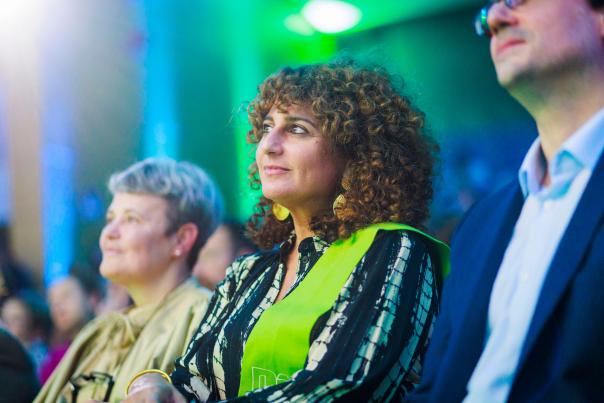
Dear Doctors Honoris Causa, thank you again for being who you are.
"You are the light of the world. A city set on a mountain cannot be hidden; and you do not light a lamp to put it under a bushel, but you put it on the candlestick, and it enlightens all who are in the house."
Thank you for letting us put you on the candlestick of the University of Namur, and, through you, all those whose voices you carry through your artistic, journalistic or apostolic work. We are proud to now count you as members of our community, and excited to be inspired by you.
To close this ceremony, I'd like to thank all those who helped make this event possible. Our new DHCs, of course, their godparents, the sign language translators (sorry I spoke so fast), the technicians, and the Communication Administration teams! Thank you for all your energy and commitment.
It's time for me to declare the 2024-2025 academic year open, and invite you to share a glass of friendship.
Namur, September 30, 2024
Annick Castiaux, Rector of the University of Namur.
(1) Loosely translated from Pedro Arrupe, S.J., in Justice with Faith Today: Selected Letters and Addresses, ed. Jerome Aixala, S.J. (St. Louis, MO: Institute of Jesuit Sources, 1980), 2:125.
